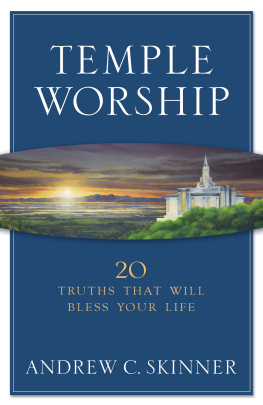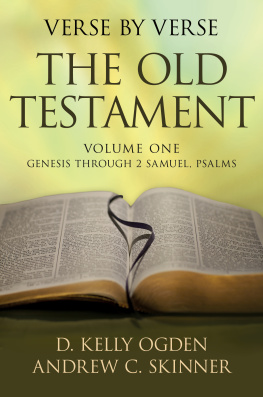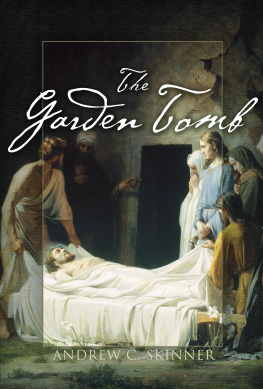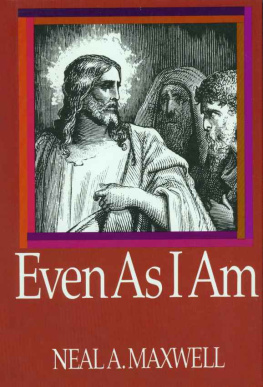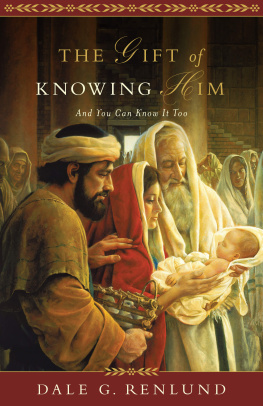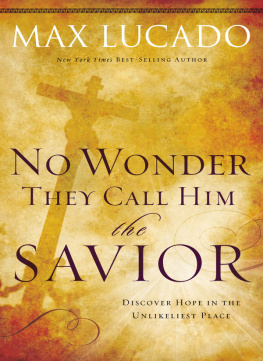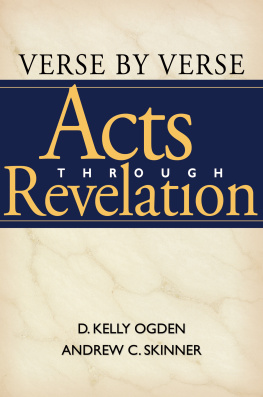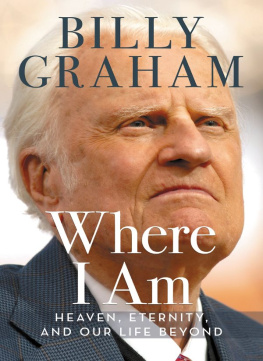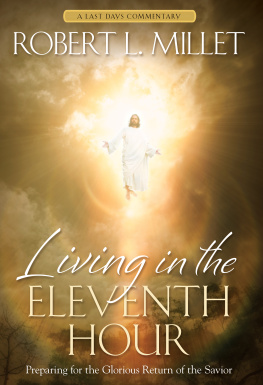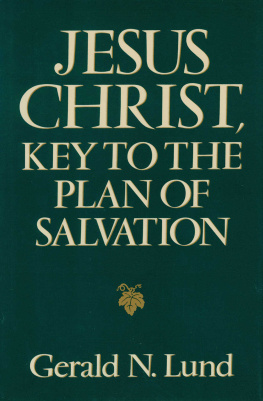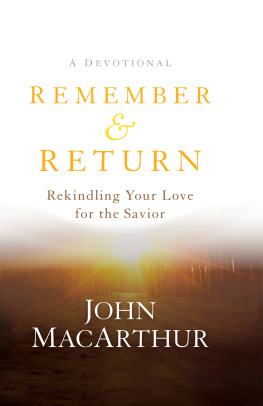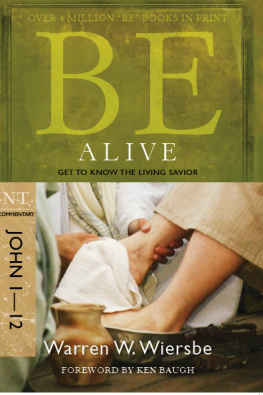2002 Andrew C. Skinner.
All rights reserved. No part of this book may be reproduced in any form or by any means without permission in writing from the publisher, Deseret Book Company, P.O. Box 30178, Salt Lake City Utah 30178. This work is not an official publication of The Church of Jesus Christ of Latter-day Saints. The views expressed herein are the responsibility of the author and do not necessarily represent the position of the Church or of Deseret Book. Deseret Book is a registered trademark of Deseret Book Company.
Library of Congress Cataloging-in-Publication Data
Skinner, Andrew C., 1951
Gethsemane / Andrew C. Skinner.
p.cm.
Includes bibliographical references and index.
ISBN 9781570088667 (alk. paper)
1. Atonement. 2. Church of Jesus Christ of Latterday SaintsDoctrines.
I. Title.
BX8643.A85 S55 2002
232'.3dc21 2002013921
Printed in the United States of America
Edwards Brothers Incorporated, Ann Arbor, MI
109876543
For my family and friends, who have taught me much about the Atonement
Introduction
Years ago I found myself sitting behind a desk in our ward meetinghouse, a young bishop trying to figure out what the Lord wanted done and how he wanted me to do it. Across the room from me was a thirteen-year-old young woman (I'll call her Brittany) who had many physical and developmental challenges. To this day she remains in my mind's eye tiny and frail. Her parents had insisted that she be baptized, even though, in my view, she did not need baptism because of her mental disabilities the Atonement was already operating in her life.
Thankfully, I remembered some counsel given by a Church leader about compassion, and I listened to Brittany's parents' request that she be interviewed for baptism. I say thankfully because that evening Brittany taught me the lesson of a lifetime. It was an experience I shall never forget.
The interview did not start out well, nor did it improve as the minutes passed. I asked Brittany question after question that she could not answer the way I thought she should be able to. She could not talk about the first principles and ordinances of the gospel the way all the other Primary children had been able to, at least up to that point in my short tenure as bishop. She could not tell me why baptism is performed or how one is supposed to perform it. I grew frustrated and, I think, so did she. We were both miserable. I began to feel vindicated in thinking we didn't need to be in this interview. It was, after all, eating up valuable time I could have been using to "save" those who really needed it couples with failing marriages, teenagers with moral challenges, and a host of other problems.
As I was about to abandon the interview, out of the corner of my eye I glimpsed a picture that the previous bishop had left hanging on the office wall. It was a framed print of the Savior in Gethsemane. At that instant the thought came into my mind, Why don't you ask her who that picture represents?
I had sense enough to follow the impression, even though my attitude wasn't in harmony with the nature of the question. I said to Brittany, "Do you know who this is?" as I pointed to the painting of the Savior, but my tone or inflection or demeanor or something made it sound like, "I'll bet you don't even know who this is!"
In a scene that remains frozen in my mind, I saw Brittany stand on her crippled feet, shuffle across the floor on the sides of her shoes, plop her hands down on the surface of my desk, lean towards me so that her face was directly in front of mine, only inches away, and say with deliberate and careful articulation, "That's Jesus and he loves us!" To emphasize her point, Brittany lifted one of her hands off the desk, drew a circle in the air while at the same time nodding her head and saying, "All of us!"
I sat stunned. How was Brittany able to teach such a profound lesson? Fortunately, she drew the circle big enough to include me, for it was clear to me that at that moment I did not deserve to be in the circle with her. Her words convicted me as well as lifted and blessed me, all in the same instant.
"He loves us." The meaning and message of Jesus' experience in Gethsemane are that simple: he loves us all of us. That is precisely the reason he went to Gethsemane as well as to Golgotha: love love for his Father, love for his Father's children, love for leaders in his Church, love for all his humble followers, love for the entire human family, and, indeed, love for each one of us as individuals. He went to Gethsemane not only to redeem Brittany from the birth defects that left her unable to explain the fine points of baptism but also to ransom me from my narrow-minded, self-important impatience and deficient behavior. He went to Gethsemane for Brittany and me and literally billions and billions of others of our Father's children.
Jesus' experience with the bitter cup that terrible night in Gethsemane changed me the night of my interview with Brittany. That night in the bishop's office, Gethsemane became very personal. Because the Savior drank the bitter cup, because he squarely faced the bitterest of experiences in Gethsemane nearly two thousand years ago, all my own bitter experiences can become sweet. That is what happened the evening of my interview with Brittany. I am persuaded that others, unseen but very real, were looking in on us.
It is fair to say that Gethsemane became a focal point of my thinking and study, one that invited me to explore its significance as explained in the scriptures. I have come to appreciate that both Gethsemane and Golgotha were critical to the Father's plan, that Gethsemane had to come before Golgotha, and that Gethsemane is a much more significant part of the Savior's atoning sacrifice than some of us might have realized. The thoughts and ideas that follow have come from my explorations in the scriptures and in the writings of latter-day prophets and apostles.
CHAPTER 1
Gethsemane and the Bitter Cup
And now, behold, I will testify unto you of myself that these things are true. Behold, I say unto you, that I do know that Christ shall come among the children of men, to take upon him the transgressions of his people, and that he shall atone for the sins of the world; for the Lord God hath spoken it.
For it is expedient that an atonement should be made; for according to the great plan of the Eternal God there must be an atonement made, or else all mankind must unavoidably perish; yea, all are hardened; yea, all are fallen and are lost, and must perish except it be through the atonement which it is expedient should be made.
ALMA 34:8-9
Because each one of us is in very deed a daughter or son of divine parents, we ought to care very much about Gethsemane. All of our Heavenly Father's planning and preparation, all of his interest in his children and all of his desires for them, all of his aims and goals for the entire universe came down to a singular moment in a specific time and place on this earth in a garden called Gethsemane. Without Gethsemane in God's eternal plan, everything else would have been a colossal wasteeverything. Without the events involving one particular Man in that olive vineyard almost two thousand years ago, God's purposes would have been utterly frustrated. Sin, death, decay, destruction, hell, and endless torment would reign supreme forever and ever. If Gethsemane had turned out to be a place associated with suffering and failure rather than suffering and triumph, everything that went before and everything that came afterward would have been reduced to a series of meaningless events in the eternal scheme of things, for there would be no eternal life. Deterioration, disorder, and chaos would ultimately fill the vastness of the universe; all beauty, human kindness, refinement, and acts of goodness would be forgotten as wasted energy. Truly, Gethsemane was the place where eternity hung in the balance.


